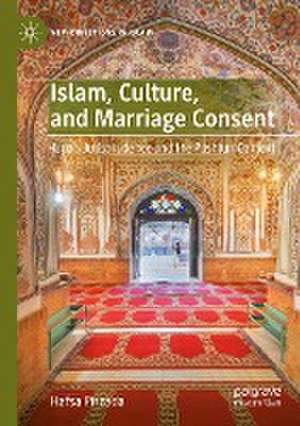Islam, Culture, and Marriage Consent: Hanafi Jurisprudence and the Pashtun Context: New Directions in Islam
Autor Hafsa Pirzadaen Limba Engleză Paperback – 13 apr 2023
Drawing on interviews with Muslims in Pakistan and Australia, the research broadly broaches questions around the rights of women in Islam and contributes to a wider understanding of Muslim social, cultural, and religious practices in both Muslim majority nations and diaspora communities. The author disentangles cultural practices from both religious and universal legal principles, demonstrating how consent seeking in Pashtunculture generally does not reflect the spirit or the intent of consent as described in Hanafī law and jurisprudence. This research will be of interest to students and scholars across sociology, anthropology, socio-legal studies, and law, with a focus on Islamically-justified law reform in Muslim nation states.
| Toate formatele și edițiile | Preț | Express |
|---|---|---|
| Paperback (1) | 725.61 lei 6-8 săpt. | |
| Springer International Publishing – 13 apr 2023 | 725.61 lei 6-8 săpt. | |
| Hardback (1) | 730.79 lei 6-8 săpt. | |
| Springer International Publishing – 12 apr 2022 | 730.79 lei 6-8 săpt. |
Preț: 725.61 lei
Preț vechi: 884.89 lei
-18% Nou
Puncte Express: 1088
Preț estimativ în valută:
138.89€ • 150.92$ • 116.74£
138.89€ • 150.92$ • 116.74£
Carte tipărită la comandă
Livrare economică 21 aprilie-05 mai
Preluare comenzi: 021 569.72.76
Specificații
ISBN-13: 9783030972530
ISBN-10: 3030972534
Pagini: 296
Ilustrații: XXV, 296 p. 2 illus.
Dimensiuni: 148 x 210 mm
Greutate: 0.39 kg
Ediția:1st ed. 2022
Editura: Springer International Publishing
Colecția Palgrave Macmillan
Seria New Directions in Islam
Locul publicării:Cham, Switzerland
ISBN-10: 3030972534
Pagini: 296
Ilustrații: XXV, 296 p. 2 illus.
Dimensiuni: 148 x 210 mm
Greutate: 0.39 kg
Ediția:1st ed. 2022
Editura: Springer International Publishing
Colecția Palgrave Macmillan
Seria New Directions in Islam
Locul publicării:Cham, Switzerland
Cuprins
1. Introduction.- Part 1. Marriage, Culture and the Law.- 2. The Cultural Context: Pashtun Muslims of Khyber Pakhtunkhwa.- 3. Marriage in Islam.- 4. Marriage Consent Operative in the Law.- Part 2. The Divergences Between Cultural Practice and Islam - 5. Researching Pashtun Culture.- 6. The Elements of Consent-Seeking in Pashtun Cultural Practice.- Part 3. Implications, Consequences and Possible Solutions.- 7. Understanding the Divergence: The Legal Implications of Divergence Between Law and Culture.- 8. Effecting Change: Bringing Cultural Practice and Legal Rights Together.- 9. Conclusion.
Notă biografică
Hafsa Khan Pirzada completed her undergraduate in Law, before undertaking her doctoral research in the interplay between culture and Islam. She is currently a Research Fellow at Griffith University, Australia.
Textul de pe ultima copertă
This book presents an empirical examination of consent-seeking among Pashtun Muslims in the Pakistani province of Khyber Pakhtunkhwa (KPK), to determine whether cultural norms and beliefs have largely come to diverge from the principles of consent in Islamic law and jurisprudence. Is culture part of the ‘inevitable decay’ to which Max Müller says every religion is exposed? Or – if rephrased in terms of the research encapsulated within this book – are cultural beliefs and practises the inevitable decay to which Islam has been exposed in Muslim societies?
Drawing on interviews with Muslims in Pakistan and Australia, the research broadly broaches questions around the rights of women in Islam and contributes to a wider understanding of Muslim social, cultural, and religious practices in both Muslim majority nations and diaspora communities. The author disentangles cultural practices from both religious and universal legal principles, demonstrating how consent seeking in Pashtun culture generally does not reflect the spirit or the intent of consent as described in Hanafī law and jurisprudence. This research will be of interest to students and scholars across sociology, anthropology, socio-legal studies, and law, with a focus on Islamically-justified law reform in Muslim nation states.
Hafsa Khan Pirzada completed her undergraduate in Law, before undertaking her doctoral research in the interplay between culture and Islam. She is currently a Research Fellow at Griffith University, Australia.
Drawing on interviews with Muslims in Pakistan and Australia, the research broadly broaches questions around the rights of women in Islam and contributes to a wider understanding of Muslim social, cultural, and religious practices in both Muslim majority nations and diaspora communities. The author disentangles cultural practices from both religious and universal legal principles, demonstrating how consent seeking in Pashtun culture generally does not reflect the spirit or the intent of consent as described in Hanafī law and jurisprudence. This research will be of interest to students and scholars across sociology, anthropology, socio-legal studies, and law, with a focus on Islamically-justified law reform in Muslim nation states.
Hafsa Khan Pirzada completed her undergraduate in Law, before undertaking her doctoral research in the interplay between culture and Islam. She is currently a Research Fellow at Griffith University, Australia.
Caracteristici
Draws on original empirical research to explore and analyse the relationship between Islamic law & cultural practise Considers the extent to which law reform could protect the rights of Muslim women and men Explores the practical and attitudinal entanglement of religious principles with cultural practice










